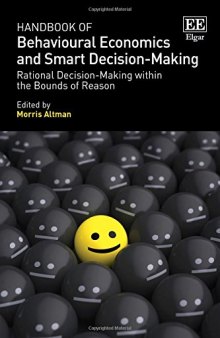 جزییات کتاب
جزییات کتاب
This Handbook is a unique and original contribution of over thirty chapters on behavioural economics, examining and addressing an important stream of research where the starting assumption is that decision-makers are for the most part relatively smart or rational. This particular approach is in contrast to a theme running through much contemporary work where individuals' behaviour is deemed irrational, biased, and error-prone, often due to how people are hardwired. In the smart people approach, where errors or biases occur and when social dilemmas arise, more often than not, improving the decision-making environment can repair these problems without hijacking or manipulating the preferences of decision-makers. This book covers a wide-range of themes from micro to macro, including various sub-disciplines within economics such as economic psychology, heuristics, fast and slow-thinking, neuroeconomics, experiments, the capabilities approach, institutional economics, methodology, nudging, ethics, and public policy.



 دانلود کتاب
دانلود کتاب

 جزییات کتاب
جزییات کتاب





 این کتاب رو مطالعه کردید؟ نظر شما چیست؟
این کتاب رو مطالعه کردید؟ نظر شما چیست؟
